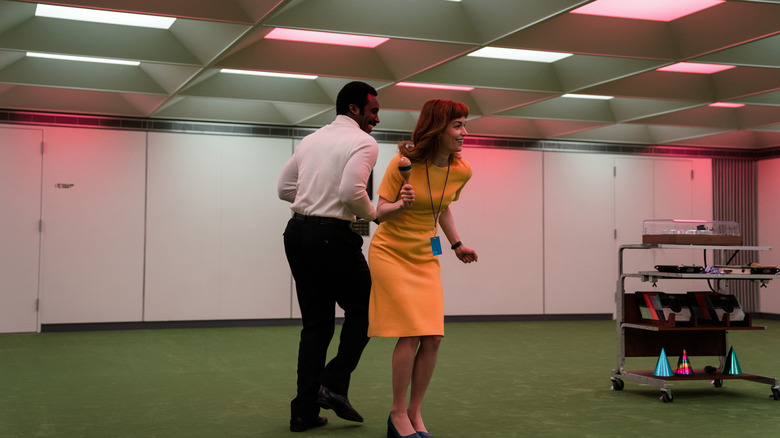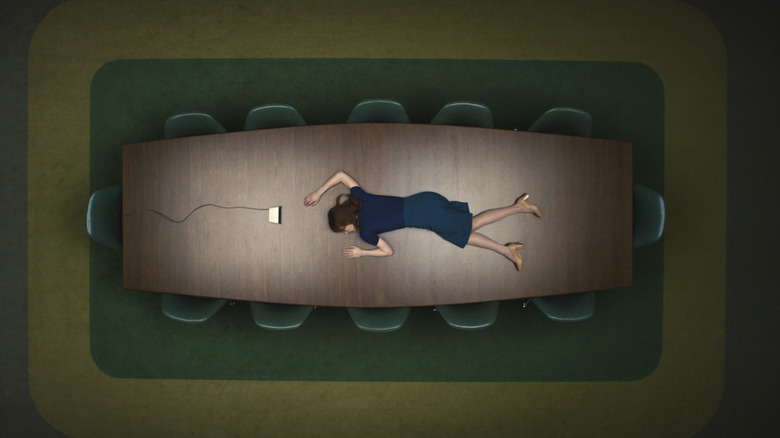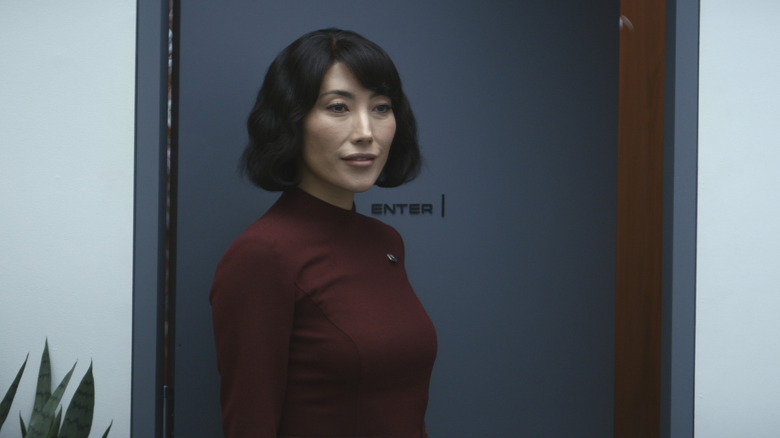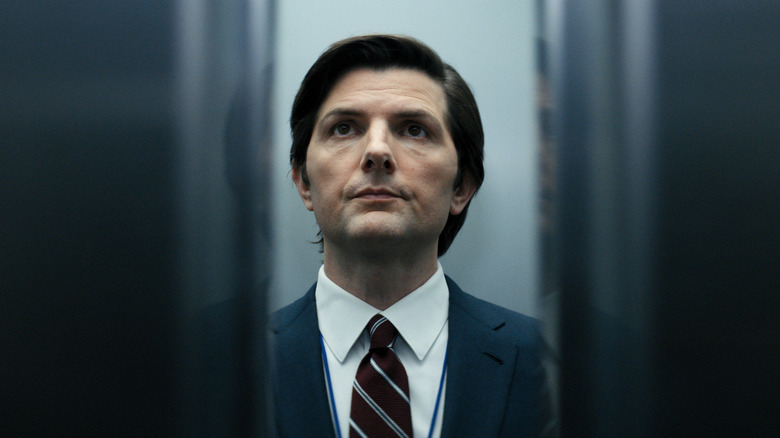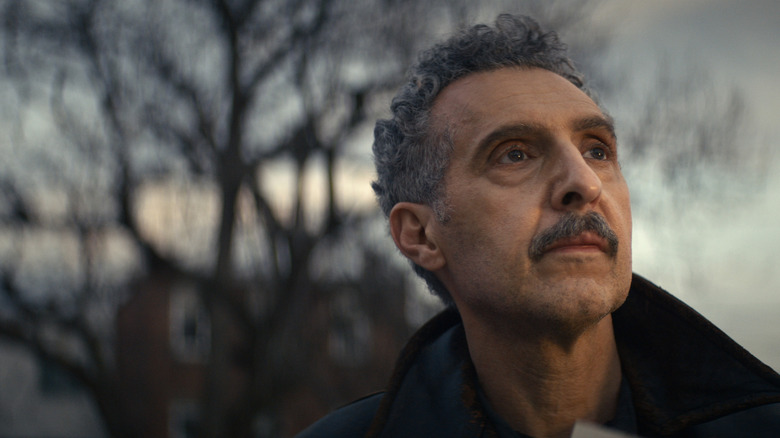Severance Composer On How That Eerie Theme Came Together And The Easter Egg You Probably Didn't Catch [Interview]
Season 1 of "Severance" makes for a compelling watch, in large part because the show's music heightens the tension, the twisted mystery of what is actually going on at Lumon Industries, and how fractured Lumon's employees truly are.
"I wanted to play around with the idea of that piano glitching and falling apart, and the idea of somebody's self fraying," "Severance" composer Theodore Shapiro told /Film in a recent interview.
Shapiro shared additional details about how he crafted the theme music for the show and also shared a little musical Easter egg for one of the severed characters. Read on for that full discussion, though be warned: There are major spoilers below for the first season of "Severance."
This interview has been edited for clarity and brevity.
"I wonder what would happen if I took those same four chords and just tried a different palette?"
Let's start with the theme, the opening section — I really love how it's very simple and starts with a few singular piano notes and then gets more complex. Can you talk about how you approached creating the piece?
It actually had a serendipitous route to coming into being, which is when [executive producer and director Ben Stiller] and I started talking about the show, I just started writing themes. I just started creating and sending him ideas to see what he would respond to. I knew that there was going to be some sort of an electronic component to the music. I wrote a piece that was largely electronic, and it had this middle section that he really liked. And so I made a mental note: Let's try to expand on that idea. It was based around four chords and I thought, "I wonder what would happen if I took those same four chords and just tried a different palette?" I sat down at the piano and started playing the idea that ultimately became the theme. I sent it to Ben, and I didn't hear anything for over a month and I was just like, "I guess he didn't like that, but that's too bad. It was a good idea."
Then one day he called, and he was like, "I was just listening to this stuff. And that piece is really great. That's really exciting." And so immediately we just started honing in on that idea.
I started trying to pull it apart as much as possible and see where that could take me, so that when they were done shooting the show, there would be a library of material based around this simple starting point that we could use to place in the film.
I noticed that, for lack of a better phrase, it's almost like a radio static but a more synthesized version. Where did that come from, especially in terms of just sort of having it weave through the piece with the piano?
First of all, that sound is actually a piano note that is reversed. I reversed the piano note and then I just started chopping out little chunks of the audio file, so that it had this weird glitchy, stutter-y sound. And then as it builds to the end, I added more and more distortion. So it is actually just a piano, but I have done stuff to it to make it seem like the piano stands in for the character — I wanted to play around with the idea of that piano glitching and falling apart, and the idea of somebody's self fraying. So that was how I got to that sound.
"You want to say something's going on without stepping on the reveal"
One place where I especially noticed the music in was the scene in the end of the episode where Helly tries to kill herself and in the beginning of the subsequent episode. I thought the music there was really interesting, especially in the beginning of the next episode in that it's very calm. And obviously, for the audience and for the characters, it's a very intense, stressful situation, but it starts calm and then there's those glitches that as you mentioned. Can you talk a little bit about the choice for using the music that way for that scene?
That material, which we use a lot for Helly's character, is like a B section of the main theme. It's also built around four chords, but they are different chords and it's like it starts out as the main theme, but it goes somewhere else. I think that what's interesting with Helly is not playing her inner discord as much as the emotional pain that she is going through. And in both of those scenes, it felt like a more interesting thing to pull out of the scene. There's a lot of chaos on the screen and playing against that and underlining her emotional pain brought an additional layer of subtext to the scene that makes it really powerful.
Another character, Ms. Casey, we find out near the end of the season that she's Mark's wife who "outie" Mark thinks is dead. When you were approaching scenes with Ms. Casey and the "innie" Mark S., did you think about ways to key in that there might be more of a connection there than the audience knows?
That's delicate, because we didn't want to tip it at all. There are a couple of scenes where they interact, where I think that we let ourselves create what I hope is a strange inexplicable tension, but without overly directing the audience. That, I thought, was an interesting challenge. You want to say something's going on without stepping on the reveal, and I mean, I feel like we probably tried. Some of those were scenes where we had a little bit of trial and error to dial it in to the right tone.
"What makes the show function is this singular thrust of peeling back the layers of the onion"
How did you approach creating the themes for characters like Mark, who are severed?
That's a really good question, and it actually speaks to just what the genesis of our creative process was. I think that when I first read the script and started, my first thought was, "Oh, okay, we've got to have a dichotomy of innie and outie."
Ben is so intuitive with music. And I love working with Ben, and the main reason is that I just trust his intuition so much, and that's something that we have developed over a lot of years. We really ended up with one main theme and not two. To the extent that there's innie and outie language to the music, the world of Mark's innie and the world of Lumon is defined by upbeat jazz material.
But ultimately, the show is really defined by a single mystery. I think that the mystery of what's at the heart of the work that they're doing down there is what defines the show. And I think that ultimately, even though it seemed logical to have this innie-outie dichotomy, what makes the show function is this singular thrust of peeling back the layers of the onion and figuring out what's at the heart of the show.
As the season goes on, there's a progression of when things get more intense for the characters. Can you talk a little bit about how you work to clue that in music-wise, of how stakes are getting higher?
I mean at a certain point, we made a decision. This was something that Ben and Jeff Richmond, the editor, and myself figured out. We figured out that from the end of episode eight, all through episode nine, it was going to be through-composed. And it was going to feel like one piece of music. Not just that there was music everywhere, but it was going to feel like one continuous idea.
Early on in the show, it's very spare. There's so much musical space and the show has a lot of space. And then as things intensify towards the end, there's a lot of drive to it. So we developed that language. And then ultimately, that language starts to seep into the show earlier than eight and nine, but we planted seeds for it. By the end, it's really driving with this sort of throbbing, percussive but subtle underbelly.
"It's such a smart piece of writing, and it was cool to find a little musical analog to go with it"
I know we talked a little bit about certain characters' themes and the thematic notes. Was there any particular character that was really memorable or really was an interesting process for you to create their sound when they were on screen?
There is this really interesting element with Irv's character. It's such a brilliant idea in the script that the visions of black tendrils that he has when he goes to sleep are ultimately revealed to be his work as a painter.
This is really subtle and probably would be hard for anybody to pick up on. When we see him as a painter, the music that he's listening to is "Ace of Spades" by Motörhead. That's not hard to pick up on. But the score that always accompanies his visions of the black tendrils is "Ace of Spades" but slowed way down and played in the language of the rest of the score. So that's a fun little Easter egg. It would probably be really, really hard to pick up on. But I love that idea in the script. I think that it's such a smart piece of writing, and it was cool to find a little musical analog to go with it.
Season 1 of "Severance" is now available on Apple TV+. Season 2 is in the works, but no news yet on when it will premiere.
